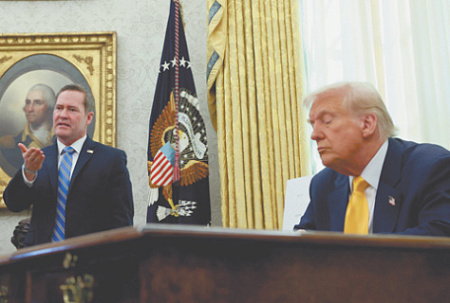
One of the most discussed political news in the United States is the resignation of Michael Waltz, Assistant to the President for National Security. Now his official duties are performed by Secretary of State Marco Rubio. Whether such a very unusual combination of positions for the United States will last or whether a new person will appear in Trump’s entourage remains a mystery. The outcome of the Russian-Ukrainian conflict may depend on how it is resolved. Dealing with it, like any other conflict in which the United States is involved, is the direct responsibility of any successor to Waltz.
Personnel changes in the Trump team have been expected for more than a month, since its members made a big mistake. At the end of March, a scandal broke out: it turned out that senior White House officials discussed the details of the military operation in Yemen in an unsecured Signal chat. Moreover, due to Waltz’s personal oversight, a journalist was added there, and one of those who criticizes the US president. From past experience, it is known that Trump is usually slow to make personnel decisions. Officials under him lose their posts some time after they make mistakes, so that the resignation does not look like it was done under pressure. Still, Trump’s breakup with Waltz came as a surprise. The American press suggested that the president would rather hand over the head of the Pentagon, Pete Hegseth. He had other mistakes besides the “Alarmgate”. Besides, it was easier to replace him, and there were no obvious replacements for Waltz.
However, Trump decided to take a chance. Waltz is likely to become the U.S. permanent representative to the United Nations. Vice President J. D. Vance, commenting on this decision, made it clear that this is not evidence of disgrace. Waltz hasn’t dropped out of the cadre, he’s just moving on to a new job. It certainly doesn’t look like it. The two positions are not comparable in importance. The Permanent Representative to the United Nations is the executor of decisions taken in the White House, the assistant for national security is the one who, to a certain extent, shapes the US foreign policy course.
Since his resignation, there have been allegations in the press, citing sources, that Trump’s claims against Waltz went beyond the scope of “Alarmgate.” The Washington Post reported on their differences on the Middle East. Waltz allegedly became a proponent of using force against Iran. He was supported in this by Israeli Prime Minister Benjamin Netanyahu, who believed that there was no other way to prevent the Iranians from acquiring nuclear weapons once and for all. Trump is now cautiously probing the ground for negotiations with Tehran. According to CBS News, Waltz was offered the post of ambassador to Saudi Arabia. In the Trump team, this is perhaps a more significant position than the permanent representative to the United Nations. But Walz allegedly rejected this proposal, preferring not to be associated at all with either the Middle East or, probably, with the Russian-American negotiation process. Recall that Saudi Arabia was the place of negotiations between the Russian Federation and the United States. The participants on the American side were Rubio and Waltz, among others.
There is a situation that has not been seen for half a century, since the time of Henry Kissinger. He combined the posts of Secretary of State and Assistant for National Security, which were different in nature. The head of the State Department is a diplomat, the head of the foreign ministry and all its services. The National security assistant combines the functions of an expert (more precisely, coordinator of the work of expert groups) and a security official, including a scout. They try not to appoint people with strong ties to the state bureaucracy or political circles to this position. Rubio’s candidacy is all the more surprising. He is a former member of the House of Representatives, a former senator, and in the recent past, an opponent of Trump, including on foreign policy issues. Now, in an interview with NBC News, Trump even calls him one of his possible presidential successors.
The American media is wondering what this unexpected rise of Rubio means. Bloomberg suggests that he is not destined to enter Trump’s inner circle and will not become a person capable of influencing the head of state. Journalists draw attention to the fact that Rubio and Waltz were like-minded in many ways. They were adherents of the old, Ronald Reagan-inspired concept of foreign policy, characteristic of the Republican Party. In other words, they advocated deepening cooperation with the traditional allies of the United States and had a negative attitude towards rapprochement with authoritarian regimes. At the same time, Rubio, unlike Waltz, has unequivocally spoken negatively about the Russian authorities in the past. Since joining the Trump team, he has changed the nature of his comments about the Russian Federation, but not the fact that he has changed his beliefs.
Interesting information was spread by CNN: Steve Witkoff, a specialist in contacts with the Kremlin, was considered for the post of Waltz’s successor. However, he himself was not eager to become an assistant for national security. Perhaps Witkoff would have changed his mind if Trump had approached him directly. But, according to CNN, there was no such appeal.
